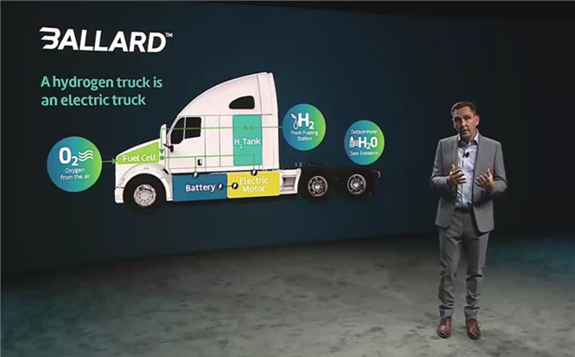Ballard Power expanded its hydrogen fuel cell line, with the addition of a 100-kW version to its FCmove platform.

Ballard says the new addition is its most powerful and flexible fuel cell engine, and is well suited for medium- and heavy-duty truck applications. The company also says it’s more compact, and easier to install, service, and maintain.
During an online product reveal, Cara Startek, director of technical solutions, said it’s 44% more compact and 33% lighter than previously available fuel cell modules of this size, and its life-cycle cost has been slashed by 40% over the previous generation product. It also boasts 50% fewer components and a longer life requiring fewer stack replacements.
The FCmove-HD+ requires little maintenance, aside from filter changes, and can be mounted in the engine bay or on the vehicle’s rooftop. It can handle cold starts to -25C and function in temperatures from -30C to 50C.
The FCmove platform represents Ballard’s eighth generation of heavy-duty power modules, and will allow the company to meet the wider range of applications – including longhaul transport – that are seeking zero emissions transport options. It’s widely believed hydrogen fuel cells will be required for longhaul trucking operations. The hydrogen fuel cells produce the energy required by the batteries on-board the truck, so charging isn’t required.
Hydrogen fueling is faster than battery charging, and the combination of a hydrogen fuel cell and battery packs generate just heat and water as emissions.
Rob Campbell, chief commercial officer with Ballard, is encouraged by the money being poured into the generation of green hydrogen.
“Billions of dollars of capital are flowing into the production of green hydrogen and we’re seeing this worldwide,” he said, noting the U.S. Department of Energy is targeting a $1/kg price point for green hydrogen by the end of the decade, making it cost-effective as well as widely available. “This hydrogen supply is coming and will match the adoption of vehicles.”
The current FCmove fuel cell line now includes 70-kW and 100-kW engines, with more to come. Nicolas Pocard, vice-president of marketing and strategic partnerships, said Ballard has been in the business for decades and has more than 2,200 hydrogen-fuel-cell trucks on the road globally, which, when combined with buses, have collectively run more than 100 million kilometers.
Startek said the 100-kW model is well suited for medium-duty trucks, and as a range extender for heavy-duty trucks. Longhaul trucks, however, may be best served by a 240-kW module being developed with Mahle.
Meanwhile, Campbell said Ballard is well on track to meet its objective to cut costs by 70% while at the same time reducing emissions involved in building the fuel cells, with a goal of being a carbon neutral company by 2030.
With the lack of maintenance requirements and moving parts, the warranty is available for up to a million kilometers depending on the use case.